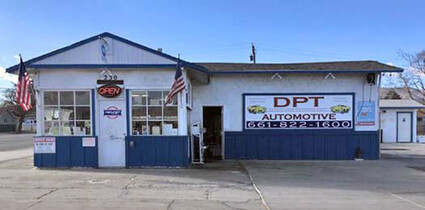4 technician questions you should ask when your car is in the shop
Helpful tips from Don's Pro Tech Automotive
April 15, 2023
Almost everyone at some point in their automotive ownership experience will visit their local auto repair shop. Whether you're a DIY weekend warrior or you just occasionally check your tire pressure and oil levels, once technicians have a look at your car they will likely make recommendations. Just like any relationship, communication is key. You don't have to be an expert to be informed but you do need to have a two-way conversation. Here are four technician questions you should always ask beyond the ever-essential "how much will it cost?"
1. Is my car safe to drive?
Though some car problems may merely be an annoyance, such as a faulty door lock actuator, there are other systems that are safety-critical, such as your brakes. Knowing whether your vehicle is safe to drive is important, especially if multiple components require attention. Just because a vehicle made it to the shop doesn't mean it is safe to drive it home.
The technicians at Don's Pro Technology Auto Repair will know how to distinguish between repairs that are critical for your safety and those that can be delayed. For example, if you had to choose between replacing a faulty windshield wiper fluid line and a frayed serpentine belt, a technician will likely recommend the latter be attended to first and foremost. While your windshield wiper fluid is important for a clean windshield and visibility, it is far more important to keep the engine itself running. If the windshield wiper fluid doesn't work you can still clean it another way. If your serpentine belt shreds you may end up stuck on the side of the road.
2. How long can I put off the repair?
Are you already riding in the danger zone, or do you have time before the issue becomes a real safety problem? Take your front brake pads, for example: Most brake pads come equipped with about 12 mm of friction material, and technicians will recommend replacement with around 3 mm friction material remaining. Most vehicles have a brake friction material minimum thickness noted in the owner's manual.
If your technician says you need new front brake pads, ask if they are metal-to-metal, or if you have a couple thousand miles to go. Your technician can help you decide if you need to spend the cash immediately or if you can postpone until a later date. If you choose to put off a repair, don't wait too long. The problem isn't going to magically fix itself. The shop's service writer should prepare a cost estimate so that you can start planning for the repair. Knowing the cost ahead of time and how long the repair will take can help manage downtime and the impact to your budget. Waiting too long for a repair can also turn a small repair into a major one involving more components than originally planned.
3. Could I have prevented this?
Repair frequency can depend on drivers' habits. If you regularly run into brake problems like brake pulsation, for instance, you could be overbraking unknowingly. If you are a rideshare driver or delivery driver you may consume wear items (like brake pads and tires) faster than normal. Overloading a vehicle can also put undue stress on not just the suspension, but the brakes and drivetrain.
Barring mechanical problems, learning to brake gradually or avoid riding the clutch in a manual transmission vehicle could go a long way toward reducing your repair bills. Ask your technician to ride along with you on a test drive; he may be able to point out some changes you can make. Simple things like slowing down for corners or avoiding potholes when possible can make life easier on your car.
4. Is it worth repairing?
As cars get older, wear and tear can amass in unrelated systems and creep up on the owner. For example, it is well-known that Toyota engines last upwards of 500,000 miles with regular maintenance. Comparatively, shock absorbers and brake calipers, especially if you live in four-seasons regions, aren't quite so long-lived. Your technician can help you decide whether it is worth it to make a certain repair. For owners of older vehicles, these could be the most important technician questions you ask.
Replacing front brake pads on a 500,000-mile Toyota Camry might be considered money well spent. In contrast, unless the car is in near-mint condition, most technicians would be reluctant to suggest a transmission rebuild or replacement. Or if you live in the rust belt, corrosion may lead to damage that simply can't be repaired without drastic measures like welding. If your technician has a laundry list of items in need of repair, you should make peace with the fact that today's repair won't be the last.
These days parts availability can come into play. Vehicle manufacturers usually only make repair parts available to support vehicles for a certain number of years. After that it is up to the aftermarket manufacturers to decide if a part is worth making. A common part that was cheap to buy 10 years ago may no longer be available or if it can be found may command a premium price. This is especially true with high-end luxury vehicles where limited production combined with high-tech designs can quickly drive a repair into the thousands.
Now is the time to weigh your options. You could simply be wasting time and money on a car that is less than or equal to the total repair costs. Calculate the total cost of repairs and compare that with a new or used car.
Final thoughts
To a technician, there is nothing better than an educated customer and having an informed conversation that includes these technician questions will go a long way toward building a good relationship. Remember, there is no such thing as a stupid question.
For more information on technician questions, chat with one of Don's Pro Technology's knowledgeable service advisors or technicians with any concerns you may have. Don's Pro Technology Auto Repair is located at 230 E. Tehachapi Blvd. in Tehachapi and can be reached at (661) 822-1600.




